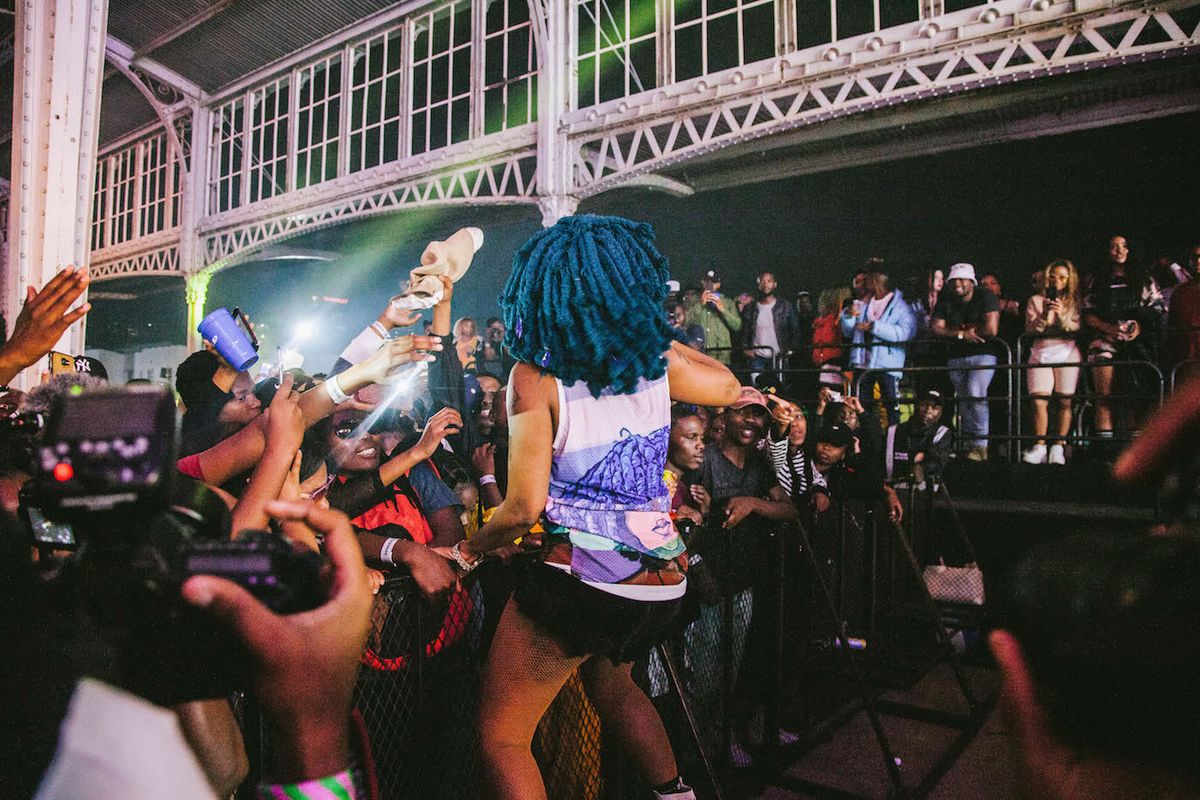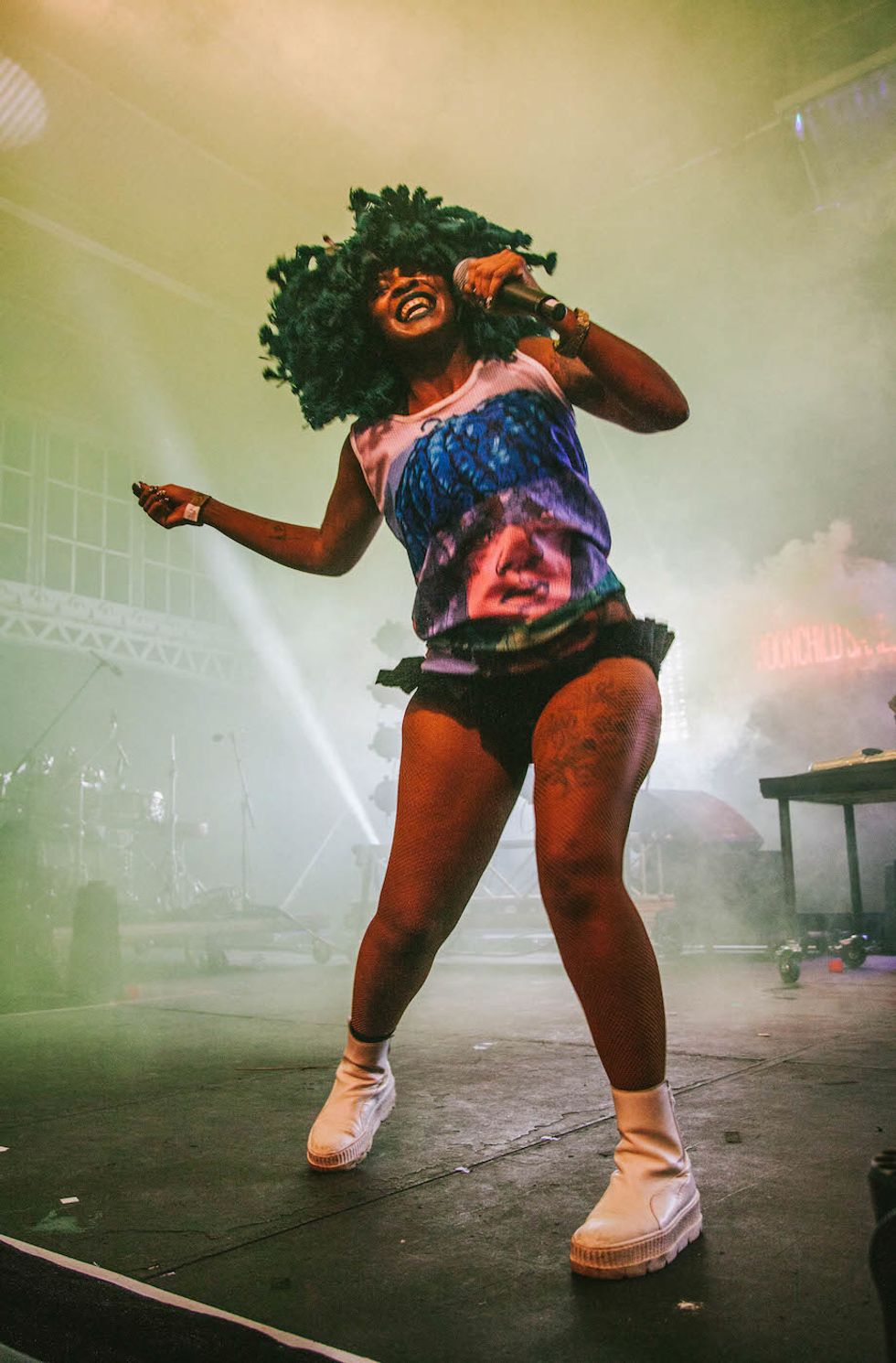This Is What It Takes for South African Musicians to Succeed Abroad
Jeremy Loops, Shimza, Moonchild Sanelly and GoodLuck discuss what it took to build their names overseas.

Moonchild Sanelly performs at Cotton Fest in 2019.
Disclaimer: The conversation which this piece makes reference to took place before the COVID-19 pandemic hit South Africa.
"I said it for 10 years that I'm going to work with Beyoncé, and everybody laughed for those 10 years. And I said it with conviction. Today, I'm on a Grammy-nominated album [on a song] with Beyoncé right now," says Moonchild Sanelly referring to the song "MY POWER" in which she's featured in alongside Busiswa, Nija, Yemi Alade, Tierra Whack and of course Queen B herself. The track is a fan-favorite from the Lion King: The Gift soundtrack album curated by Beyoncé. Moonchild is pulling out these receipts to elaborate a point she just made about self-belief which helped her build a career that's recognized globally, a feat very few South African artists have achieved.
A few of those artists— Jeremy Loops, Shimza and Juliet Harding (a member of the versatile electronic band GoodLuck)—are on the podium alongside Moonchild during the Midem Africa Conference in Langa, Cape Town towards the end of February. The four musicians are in conversation with Trenton Birch, musician and founder of Bridges for Music Academy, sharing their secrets to breaking into the highly competitive and advanced music markets of mainly Europe and the US.
Shimza, whose One Man Show franchise was sold out in France in 2019, feels it's important to first build a base at home before an artist can cast their net abroad. It worked for him. "It's really important for you to build a base around the people that really understand the music so that you can have a proper solid base," he says. "Especially in the scene that we are in where we want to export the music that's not really existing anywhere else in the world. Also, for me, building that base in South Africa was a plus because then I had some sort of cushion for if I want to go overseas and they're telling me that they're only paying for my flights, I know I can finance that trip myself. If I need to run a PR campaign, I've got a bit of money from my career back here at home to finance all of those things."

Shimza's model is similar to Jeremy Loops'. The musician who used to be a one-band man went from basking in the streets of Cape Town to being a globally-celebrated artist, performing on many major festivals across the globe and throwing his own tours such as the Jeremy Loops US Tour and Trading Change Tour. He used the funds he generated from shows in South Africa to travel abroad and shake hands with stakeholders. More about that and why Jeremy Loops is pushing for international collaboration here.
GoodLuck has become a notable export of the Cape Town electronic music scene. Their sound, which is a combination of EDM and other genres like jazz and pop, has resonated abroad. Their songs have been playlisted on radio stations in Europe and they are always on the road for performances abroad. They attribute their success to collaborations with artists from the regions they want their footprint to extend to. "We have piggybacked a little bit on other artists," says Juliet. "For example, when you release a song in the Netherlands, you've got a much higher chance of getting that song on radio if you're releasing it as a co-release with another Dutch artist because they've got a quota of local music they have to fill."
Just like Jeremy Loops and Shimza, by the time GoodLuck started exploring overseas, they were notable names in their respective corners of the South African music scene.
For Moonchild, however, it worked the way round. Many music fans who are now stanning for her sexually progressive and provocative lyrics and sensual dance moves weren't necessarily getting jiggy to songs from Rabulapha!, her debut album when it came out in 2015. The artist was performing across the globe years before she would appear on mainstream hits such as Maphorisa's "Midnight Starring" and "Iwalk Yephara" in 2018.
She recalls being on festival lineups, but no one knew she was even from SA. "South Africa wasn't supporting me," she says, "They didn't even know me. I'd be on the same lineup as commercial South African artists and they'd say they were the first South African artist [to ever perform in that festival]. And I'd be like, 'but, it's my third year there.'"
Reflecting on those early stages of her ventures, she says: "I used to do the shows, and I've literally landed in France with only, like, R100, but my mission was bigger than my hunger. But in the second year I went with R500. I was establishing relationships to a point where now when I go back to SXSW, there's a club that I host at because of the consistency and me investing the time. And, now I don't go [overseas] for free."
The irony of all this is that some of the country's biggest artists are relatively unknown abroad except for the likes of Black Coffee. It's usually alternative artists such as
MUZI, DJ Lag, BLK JKS, Yugen Blakrok, Spoek Mathambo and the ones on the panel, who forge thriving careers in the west. Some of the country's biggest artists, especially hip-hop, may be known, but haven't made considerable dents abroad. Every now and then they will make an appearance at SXSW or Sway in The Morning, but it always ends with those moments. Moonchild, responding to a question from the audience, reveals she has watched the likes of Kwesta and K.O perform abroad.
"I was at their shows in those years, and it's not the same as every other genre." She mentions she feels they lack consistency. "They go do a show and then they leave and never come back again. Hip-hop is different, it's a different genre altogether, and it's not as respected."
South African hip-hop is mostly criticized for lacking "authenticity" as most of the music is copied and paste from their US counterparts'. Jeremy Loops, Shimza, Moonchild Sanelly and Juliet all agree that making music that bears a stylistically South African stamp puts artists at an advantage when it's time to export their music. "We're not saying be what you would ordinarily be in Soweto," says Shimza, "but stay true to who you are. And just adjust a bit, but always remember that you need to be unique so that there is something for us to sell."
Jeremy Loops adds that those markets' vastness and willingness to hear innovative sounds puts artists at an advantage. "It's such a big industry that whatever style of music you make, there's an audience over there that's big enough to support it, and you start to find it," he says. "Whereas here, we all fight for the same audiences in a way. There's the same kind of festivals, and you either sit down a black lane or you sit down a white lane."
- Why South African Folk Artist Jeremy Loops Is Pushing For ... ›
- It Will Take More Than an 'Authentic African Sound' for South African ... ›
- 12 Essential Anti-Apartheid Struggle Songs from South Africa and ... ›
- South Africans Are Trying to Figure Out Why Nigerian Musicians ... ›
- 15 South African Female Musicians Pushing the Boundaries ... ›
- The 20 Best South African Songs of 2019 - OkayAfrica ›
- 7 South African Female R&B/Soul Artists to Watch In 2020 - OkayAfrica ›
- Here Are The Most Streamed South African Songs, Albums and ... ›
- The WAV 2019: 10 Artists Shaping the Future of South African Music ... ›
- 12 South African Artists to Look Out For In 2020 - OkayAfrica ›
- 15 South African Artists to Watch in 2019 - OkayAfrica ›
- Listen to Alle Farben's House Remix of Jeremy Loops’ ‘Mortal Man’ - OkayAfrica ›
- Midem Africa Announces Free Talks Featuring Mr Eazi, Focalistic & More - OkayAfrica ›
- Msaki's New LP Is a Bold Conversation Between Protest & Love - OkayAfrica ›
- The 4 Songs You Need to Hear This Week - OkayAfrica ›
- The 4 Songs You Need to Hear This Week - OkayAfrica ›
- The 8 Best South African Songs of the Month (February) - OkayAfrica ›
- The 20 Best South African Songs of 2022 So Far - OkayAfrica ›
- The 9 Best South African Songs of the Month (August) - OkayAfrica ›
- Moonchild Sanelly Slams Radio Stations for Pulling 'Askies' - OkayAfrica ›
- The 28 Best South African Songs of the Month (April) - Okayplayer ›
- The 13 Best South African Songs of the Month (March) - Okayplayer ›
- 10 South African R&B Artists To Check Out - Okayplayer ›
- Listen to DESIREE’s Funky Interpretation of Selaelo Selota’s Classic “Thrrr… Phaaa!” - Okayplayer ›
- The Last 30 Years of South African Music - Okayplayer ›

